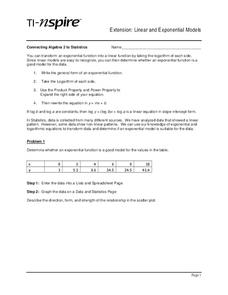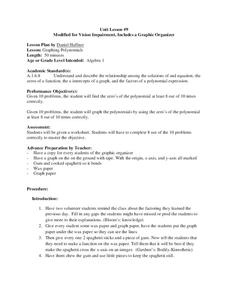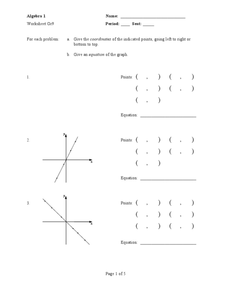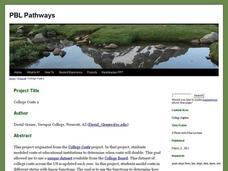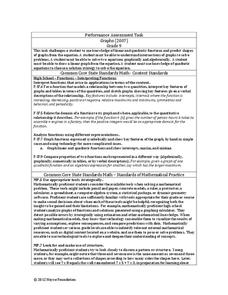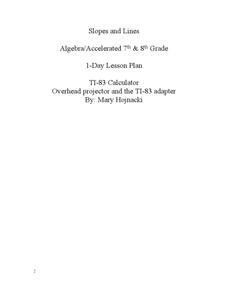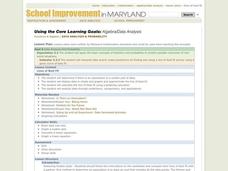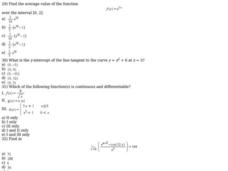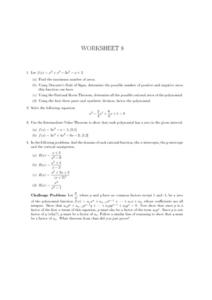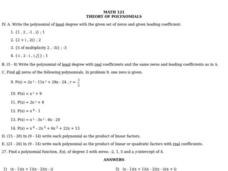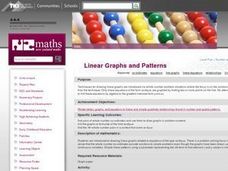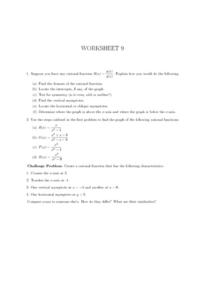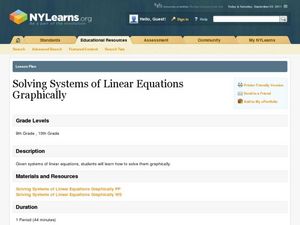Curated OER
Linear and Exponential Models
High schoolers investigate the differences between linear and exponential models. In this linear and exponential models activity, students make a table of given data. High schoolers determine if the data is linear or...
Curated OER
Algebra 2 Test
In this algebra instructional activity, 11th graders test their knowledge of functions and slopes. They solve equations and identify functions, find the inverse and find the equation of parallel and perpendicular lines. There are 21...
Curated OER
Exploring Quadratic Equations
By stretching and translating the parabola given and determining the effects on the equation, young scholars explore finding the vertex and zeros of a parabola and relate them to the equation. Students also view the intercept form to...
Curated OER
Graphing Polynomials
Students graph polynomial equations using different methods. In this algebra lesson, students identify the different ways the x and y values relate in a graph. They solve for x by finding the zero's of the polynomials.
Curated OER
Coordinates and Equations
In this algebra worksheet, students solve linear equations and plot their results on the coordinate plane. There are 20 problems using slopes and intercepts to help graph linear equations.
PBL Pathways
College Costs 2
What is the financial benefit for attending a community college for the first two years before transferring to a four-year college? The second part of the educational lesson asks young scholars to explore this question through data...
Inside Mathematics
Graphs (2007)
Challenge the class to utilize their knowledge of linear and quadratic functions to determine the intersection of the parent quadratic graph and linear proportional graphs. Using the pattern for the solutions, individuals develop a...
College Board
Random Variables vs. Algebraic Variables
Variables can vary in meaning. A reference material for AP® Statistics explains the difference between random and algebraic variables. It provides a hypothetical situation involving dice—great for use in a classroom situation.
Curated OER
Slopes and Lines
Pupils identify the slopes of a line. In this algebra activity, students calculate the slope and intercept of a line. They graph their lines using a TI calculator.
Curated OER
Lines of Best Fit
Students explore the concept of line of best fit. In this line of best fit lesson, students find lines of best fit in examples about riding your bike home from school and dentistry. Students find two data points and find the line of best...
Curated OER
Quadratic Rules and Graphs
Students identify the properties of quadratic equations. In this algebra lesson, students find the vertex and intercepts of a parabola. They factor quadratics and identify the zeros of the equations.
Curated OER
Average Value of a Function
In this calculus worksheet, 12th graders calculate the line tangent to a curve and find the average value of a function. There are 12 questions.
Curated OER
Academic Algebra II 1st Semester Exam
In the semester exam, students solve problems dealing the the discriminant of quadratic equations, systems of equations, linear equations and inequalities. Students also simplify radicals, complete squares, and find the inverse...
Curated OER
Worksheet 8, Exponents
In this calculus worksheet, students analyze one equation by finding the maximum number of zeros. They use Descarte's Rule of Signs and the rational roots theorem. Students use synthetic division to factor the polynomial. Students solve...
Curated OER
Nine Exercises Matching Lines To Their Equations
For this math worksheet, students match the line of the graph with the corresponding equation. The goal is to practice finding the slope for each.
Curated OER
Theory of Polynomials
In this polynomial worksheet, students find all zeros of polynomials. They write polynomials as the product of linear fractions. This two-page worksheet contains 27 problems. The second page provides answers.
Curated OER
Identifying slope from Equations
Students find the slope of a line given a linear equation in slope-intercept form. They also find the slope of a line given a linear equation in standard form. Students finally graph the line to show it visually.
Curated OER
Linear Graphs and Patterns
Fifth graders find pairs of whole number co-ordinates and use them to draw graphs in problem contexts. They find and interpret the all meaningful pairs of whole number co-ordinates from graphs.
Curated OER
Worksheet 9, Rational Functions
In this algebra worksheet, students tell how they would find the domain of a rational function. They find the intercepts of a rational function and graph it. Students test for symmetry, locate the asymptotes and determine where the graph...
Curated OER
Composition of Functions
Students solve problems using the composition of functions. For this algebra lesson, students analyze the graph of a quadratic equation for its vertex and intercepts. they find the inverse of the function using addition, subtraction,...
Curated OER
The Standard Form of A Quadratic Equation
High schoolers investigate equations that are in the standard form of a quadratic equation represented as Y=ax2+bx+c. They factor the equations into linear factors to determine the x intercepts. The graph is also used to determine the x...
Curated OER
Solving Systems of Linear Equations Graphically
Students solve systems of equations graphically. For this algebra lesson, students find the point of intersection of two lines if they are not parallel. They rewrite the equation in the y=mx + b form and graph using slope and intercept.
Curated OER
Slope of a Function
Seventh graders explore the concept of the slope of a line. They see how to determine the direction of the line. Also students are introduced to the slope intercept algebraic expression in conjunction with the rise/run.
Curated OER
Numerical Analysis: Introduction to Approximation Theory
In this introduction to approximation theory, students compute the slope and intercept of a line. They describe nonlinear relationships. This four page worksheet contains approximately five problems.
